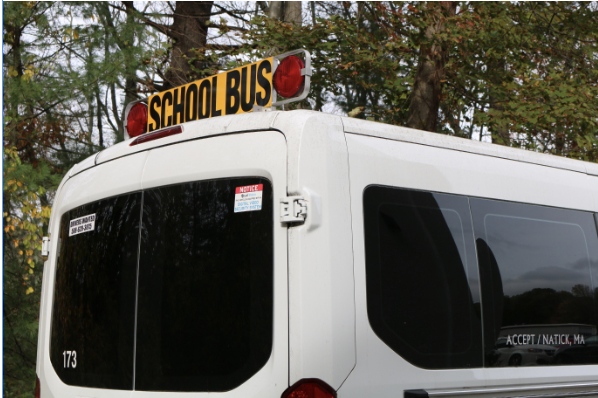Transportation

Please contact us with any questions/concerns:
THE IMPORTANCE OF SPECIALIZED TRANSPORTATION
Each day more than 299 students are picked up at their homes, delivered to over 104 destinations, either their special education program at ACCEPT or other schools in Massachusetts, and safely returned home at the end of the day. A fleet of over 112 vans, 77 drivers and 19 monitors meet the individual needs of each student ensuring a comfortable and positive experience.
All at a significant discount as compared to for-profit specialized transportation providers.
ACCEPT’s robust transportation program has evolved over the past four decades in response to district requests. We are constantly looking for ways to streamline processes and improve the quality of the experience. Safety, our number one priority, has been enhanced in recent years with the adoption of new technologies including GPS systems, cell phones, and cameras. All ACCEPT drivers undergo a complete pre-employment screening, including fingerprinting, criminal background checks, and driving safety verification. Additionally, drivers and monitors are provided regular in-service education on disability awareness, how to handle difficult student behaviors and situations, and other relevant topics.
Transporting such a large number of students with disabilities requires a complex and finely tuned system:
- Each of the 299 students has an individual set of needs and an individual route.
- Students are transported, typically with 2-4 students per van, requiring coordination of a number of factors including routes, need for a monitor, begin/end time of the school day, avoiding an overly long ride, and a myriad of other small, but consequential, details.
- Routes change daily and communication is key. If a child’s transportation changes or a van is running late, a web of communication is required. With no room for error, two dispatchers keep track of the daily schedule for every student, van, driver, and monitor at all times.
- A wide range of situations can occur while on the road including medical emergencies, mechanical failures, detours, traffic jams, an absent parent/caregiver upon arrival, and more. Policies and procedures are constantly reviewed and updated to provide staff with direction on how to manage a variety of situations.
- Hiring and retaining van drivers and monitors is an ongoing challenge. Competition for hard-working, patient, compassionate staff is intense, especially since most of our staff work an unconventional schedule of an early morning route, a break mid-day, and an afternoon route. Perks such as personal use of the vans, paid training, CPR certification, a variety of bonus programs, and paid commercial licenses help us retain good drivers.
